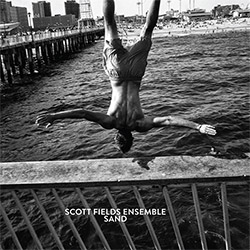
The guitar-heavy trio featured on 2008's Bitter Love Songs (Clean Feed), where this reviewer first became aware of Scott Fields' advanced sonic discernment, radiated a broad sense of discontent, or caustic hatred if you will. Through the intervening fifteen years, Fields has gradually turned into a versatile composer for ensembles of various sizes. He envisions works whose intelligibility and coordination advance at the same rate as the clever freedom provided to the performers by scores that exploit modularity quite effectively. Sand, conceived in 2021 and recorded live in 2022 at the Alte Feuerwache in Cologne, is one such piece.
Fields, who did not play on this occasion, conducted twenty-three fine musicians in an impressive display of complex counterpoints, incisive sketches and educated noises. The (female) voices and instrumental characters — winds, percussion and strings including electric guitars — are broken up into groups of two and three. The solitary instruments still fall within the string or wind category. There are nine tracks on the CD, yet they are not "movements" because each segment reflects a unique interpretation of the entire work. Had we not read this, we might not have realized how greatly the outcomes change from one version to another.
You won't be able to memorize this album, not even after many spins. Instead, it serves as a lesson in how to coexist with, and be absorbed by, the natural diversity arising from the chemistry of a sizable ensemble left to function in accordance with preset rules. The voices sing or recite text fragments that are cyclically repeated, cross paths several times, and were inspired by the composer's own observations. Evident meanings are absent, but some constituents stick to memory more than others, with special attention on a raised middle finger and a bench confiscated by city officials.
The relationships between singers, winds, percussion and strings express multiple degrees of dynamic intensity, depending on the rendition. In situations involving superimposed vocal fluxes, a fantasy emerges about Edgard Varèse orchestrating the dismemberment and reconfiguration of Philip Glass and Robert Wilson's Einstein on the Beach. During the majority of the time, "chamber-to-chaos" delights are to be savored, always reminding ourselves that the players are behaving in line with properly designed instructions. Luckily, there is no trace of "jazz" whatsoever. If anything, we may daydream (again) of a coup in a conservatory, staged by artists endowed with the ideal balance of nihilism and enlightenment.
All of this takes place under the auspices of Fields' creative identity, which keeps him cognizant of the virtues and flaws (especially the latter) of contemporary humanity. The result of a shrewd use of his imaginative faculties — in turn passed on to receptive coworkers — is right here for us to enjoy, with Reuben Radding's gorgeous cover image sealing the envelope.
Comments and Feedback:
|



